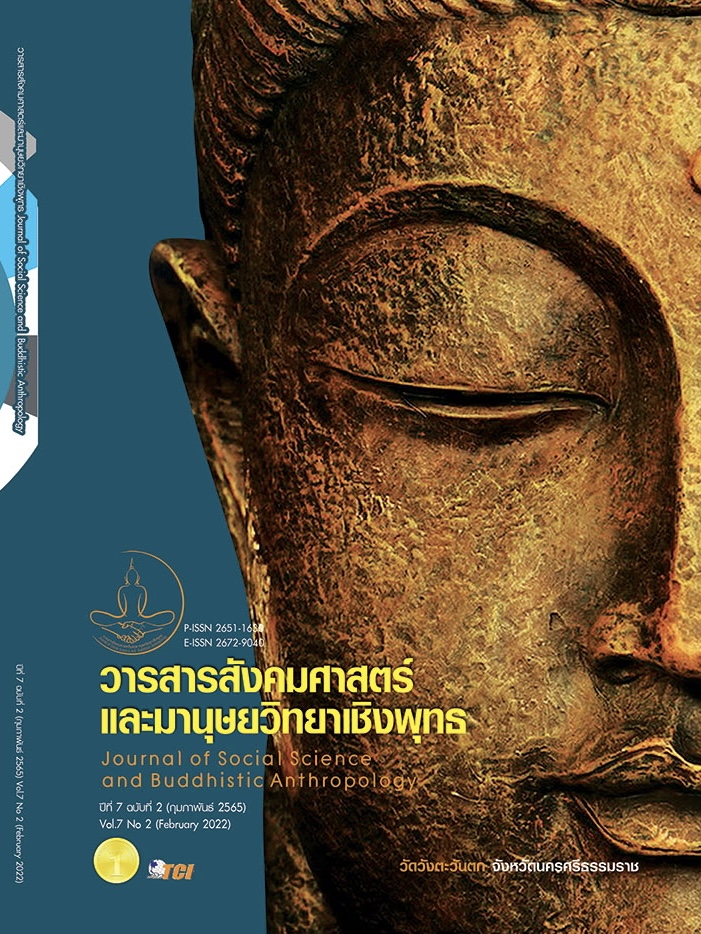DEVELOPMENT OF LEARNING COMMUNITY TO ENHANCE CREATIVE SKILLS IN INNOVATION RESEARCH OF GRADUATE STUDENTS
Keywords:
Learning Community Model, Learning Achievement, Innovation Research, graduate studentsAbstract
The Objectives of this research article were to 1) develop learning community model which the enhancement of creative skills in innovation research was integrated into learning and teaching for graduate students, 2) study graduate students’ research skills learning achievement, 3) study graduate students’ innovation research work ability, and 4) evaluate graduate students’ satisfaction towards the learning community model. The quasi-experimental design was employed and the sample group was selected by using a purposive sampling technique, including 12 first year graduate students of Suryadhep Teachers College, Rangsit University, Pathum Thani in Semester 1 of 2020 Academic Year. The instruments included 1) learner’s research learning community model in the form of website for learning and teaching, 2) a knowledge and educational research skills assessment form, 3) an innovation research work ability evaluation form, and 4) a graduate students’ satisfaction form. Percentage, mean and standard deviation (SD) as well as t-test for dependent samples were applied for statistical analysis. The results revealed that 1) the development of community learning model integrated into learning and teaching showed the highest level of suitability and the four components of the model consist of 1) Input 2) Process of learning 3) Output and 4) Feedback, 2) the students’ learning achievement after the model implementation was higher with the significant level at .05, 3) students exhibited the high level of innovation research work ability ( = 3.93) and 4) the students had a high level of satisfaction towards the learning community model (
= 4.42, S.D.=0.47).
References
จอมสุรางค์ ลิมป์ประเสริฐกุล และธัรพงษ์ วิริยานนท์. (2562). การพัฒนารูปแบบการเรียนการสอนแบบชุมชนการเรียนรู้ เพื่อเสริมสร้างความคิดสร้างสรรค์ และการทำงานเป็นทีม ของนักศึกษาระดับปริญญาตรี. วารสารวิชาการครุศาสตร์อุตสาหกรรม พระจอมเกล้าพระนครเหนือ, 10(2), 148-156.
ใจทิพย์ ณ สงขลา. (2548). การออกแบบการเรียนการสอนบนเว็บ ในระบบการเรียนอิเล็กทรอนิกส์. กรุงเทพมหานคร: ศูนย์เอกสารและตำราคณะครุศาสตร์.
ชุติมา สัจจานันท์. (2554). การวิเคราะห์วิทยานิพนธ์แขนงวิชาสารสนเทศศาสตร์สาขาวิชาศิลปศาสตร์มหาวิทยาลัยสุโขทัยธรรมาธิราช (ปีการศึกษา 2546 -2553). วารสารวิชาการ บัณฑิตศึกษา มหาวิทยาลัยราชภัฎนครสวรรค์ , 6(17), 1-12.
ฐิติยา เนตรวงษ์ และคณะ. (2554). ผลการใช้รูปแบบการเรียนร่วมเพื่อสร้างชุมชนการเรียนรู้ทางออนไลน์ของนักศึกษา มหาวิทยาลัยราชภัฏสวนดุสิต. วารสารวิจัย มสด สาขามนุษยศาสตร์และสังคมศาสตร์, 7(1), 1-10.
บุญชู บุญลิขิตศิริ. (2553). การพัฒนากระบวนการสร้างความรู้ในชุมชนการเรียนรู้เชิงเสมือนสำหรับนักวิชาการในสถาบันอุดมศึกษา. ใน ดุษฎีนิพนธ์ครุศาสตรดุษฎีบัณฑิต สาขาวิชาเทคโนโลยีและสื่อสารการศึกษา. จุฬาลงกรณ์มหาวิทยาลัย.
มะยูตี ดือรามะ. (2555). การพัฒนาทักษะการทำวิจัยชั้นเรียนของนักศึกษาหลักสูตรประกาศนียบัตรวิชาชีพครู มหาวิทยาลัยอิสลามยะลา ด้วยกระบวนการเรียนรู้ด้วยตนเอง. วารสาร อัล-ฮิกมะฮฺ มหาวิทยาลัยอิสลามยะลา, 2(4), 37-44.
วันวิสาข์ แก้วสมบูรณ์ และคณะ. (2557). ใน รายงานการวิจัยปัจจัยในการสำเร็จการศึกษาล่าช้าของนิสิตระดับบัณฑิตศึกษา. มหาวิทยาลัยทักษิณ.
วิจารณ์ พานิช. (2555). วิถีสร้างการเรียนรู้เพื่อศิษย์ในศตวรรษที่ 21. กรุงเทพมหานคร: มูลนิธิสดศรี-สฤษดิ์วงศ์.
สนอง โลหิตวิเศษ. (2559). ชุมชนแห่งการเรียนรู้. สารานุกรมศึกษาศาสตร์ คณะศึกษาศาสตร์ มหาวิทยาลัยศรีนครินทรวิโรฒ, 51(2559). 31-40.
Office of Learning Technologies. (1998). Model of Community Learning Network in Canada. Canada: New Economy Development.
Downloads
Published
How to Cite
Issue
Section
License
Copyright (c) 2022 Journal of Social Science and Buddhistic Anthropology

This work is licensed under a Creative Commons Attribution-NonCommercial-NoDerivatives 4.0 International License.









